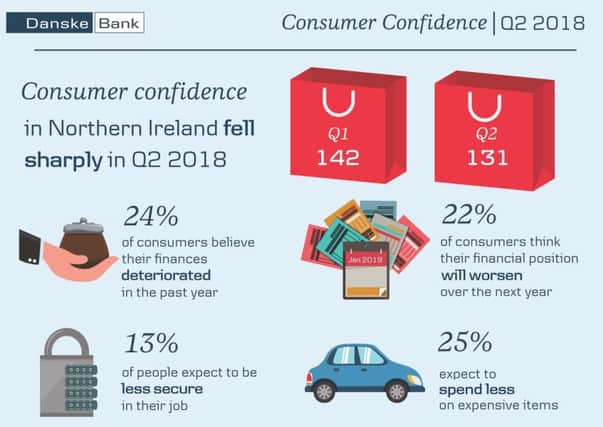Consumer confidence falls sharply across province


The Danske Bank Northern Ireland Consumer Confidence Index fell back to 131, down from 142 in the first quarter of the year and 139 a year ago.
Across four areas the index recorded drops though rising wages were highlighted as a major positive force.
Advertisement
Hide AdAdvertisement
Hide Ad“This fall in consumer confidence reverses some of the pickup in confidence levels that we saw at the beginning of 2018,” said Danske chief economist Conor Lambe.
“The latest index value of 131 is above the four-year low observed at the end of last year, but represents a sharp fall from the first quarter of this year.”
Consumers continued to highlight the local political impasse and high inflation as factors having a negative impact on their confidence levels, the index found.
“Falls were recorded over the quarter and over the year in all four parts of our index, covering how consumers feel about their current finances, future finances, job security and future spending.
Advertisement
Hide AdAdvertisement
Hide Ad“Despite the fall in confidence, our survey did reveal some good news as 18% of respondents identified rising wages as the factor having the largest positive impact on confidence, suggesting that the relatively strong performance of the local labour market is putting upward pressure on wage growth.”
Almost a fifth (17%) of respondents felt that their financial position had improved over the past 12 months, but 24% felt it had deteriorated.
Among full-time workers, part-time workers and students, the proportion of people that felt better off than last year was higher than the proportion that felt worse off.
However, across the unemployed, retirees and people looking after the home, a larger percentage of people felt worse off than felt better off.
Advertisement
Hide AdAdvertisement
Hide AdThere was also a fall in the part of the index focused on consumers’ expectations regarding their financial position in the next year.
“Despite expectations that inflation should gradually fall towards the Bank of England’s 2% target, and that wage growth will be higher given the strength of the labour market, consumers are still downbeat about their future finances,” said Mr Lambe.
“It’s clear that factors such as Brexit and the lack of an Executive are not only negatively affecting the wider economy, they are also negatively influencing consumers’ expectations about their individual financial positions.”
On employment, young people felt more confident about their job security than older people.
Advertisement
Hide AdAdvertisement
Hide AdFor 16-24 year-olds, the percentage of people that felt that their job security would improve was higher than the proportion that felt it would deteriorate.
For people aged 25-34, the percentage balance was equal but, for those aged over 35, the proportion expecting their job security to deteriorate was higher than the proportion expecting it to strengthen.
Analysis of anticipated spending on high value items also showed a decline to 135, down from 148 in quarter one and 146 in the same period last year.
A fifth (21%) of consumers expected to spend more on expensive items, such as furniture and holidays over the next year, but 25% expected to spend less.
Advertisement
Hide AdAdvertisement
Hide AdUnsurprisingly, savings expectations fell over the quarter and over the year.
Less than a tenth (9%) of people expected to save more this year than they did last year, while but 26% thought they wouldn’t be able to save as much over the year ahead.